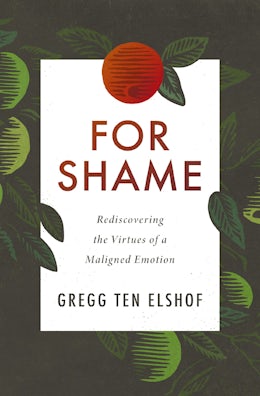Book Summary
We celebrate when wrongdoers are shamed and cringe at shamelessness in public figures, yet too often suffer with our own private burden of shame. What are we to make of this powerful, confounding emotion? Is shame good or bad? In For Shame, author Gregg Ten Elshof brings clarity to shame and rediscovers the unexpected virtues hidden within it.
About the Book
Can a better understanding of shame lead us to see its positive contribution to human life?
For many people, shame really is a destructive and health-disrupting force. Too often it cripples and silences victims of other people's shameful behavior, and research has demonstrated clearly the damaging effects of shame on our emotional wellbeing. To combat this, a mini-industry of resources and popular therapies has emerged to help people free themselves from shame.
And yet, shame can contribute to a healthy emotional and moral experience. Some behavior is shameful, and sometimes we ought to be ashamed by wrongs we've committed. Eastern and Western cultures alike have long seen a social benefit to shame, and it can rightly cultivate virtues both public and personal.
So what are we to make of shame?
Philosopher and author Gregg Ten Elshof examines this potent emotion carefully, defining it with more clarity, distinguishing it from embarrassment and guilt, and carefully tracing the positive role shame has played historically in contributing to a well-ordered society.
While casting off unhealthy shame is always a positive, For Shame demonstrates the surprising, sometimes unacknowledged ways in which healthy shame is as needed as ever. On the other side of good shame, lie virtues such as decency, self-respect, and dignity—virtues we desire but may not realize shame can grant.
Reviews
'Brilliant, clear, and cogent! Gregg Ten Elshof makes a persuasive and important case that except for in the post-Enlightenment West, shame has been considered an important social emotion, signaling that we have lost standing in the community. In the age of social media, where our lives are more exposed than ever, Ten Elshof shows us that the journey out of shame cannot be made by an individual alone but depends on a community of others who will help bring the person honor.'
'In a culture that is suspicious of shame but accepting of shaming, Gregg Ten Elshof makes a powerful case that we've gotten things exactly backward. This work places shame (and shamelessness) in the context of rival views of human flourishing and the history of philosophy, East and West. This book also takes empirical research in psychology seriously but not uncritically. His reinterpretation of the story of the prodigal son as a rescuing from shame is deeply illuminative. Clearly written, free of technical jargon, and biblically informed, Ten Elshof's absolutely terrific exploration of shame deserves wide readership.'
'In For Shame, Gregg Ten Elshof provides readers with new eyes to see a recently disparaged but important dimension of human psychology that is tied to social reality. With his characteristic combination of careful analysis and life-enriching wisdom, he clarifies the true nature of shame and its valuable role in human flourishing. In doing so, he offers a timely and prophetic corrective--both to current efforts in our individualistic society to eliminate shame from our lives altogether and to the increasingly prevalent but destructive practice of shaming other people. With sensitivity to the nuances of the human condition and an artful use of examples and stories to illustrate human experience, Ten Elshof helps readers see the essential contribution of shame to a life well lived. Readers will gain a fresh and fruitful perspective on themselves, the society in which we live, and the gospel that takes away the shame of our sin. It's an honor for me to recommend For Shame as a thorough and fair-minded case--for shame.'
'With examples from life, philosophical analysis, biblical stories, and humor, Ten Elshof argues that there is a narrow band of appropriate feelings of shame that are actually positive. He points out that most of us want to be well-regarded in a community of others we respect, feeling honored rather than feeling shame, and this urge to avoid feeling shame can contribute to the good of our communities. However, he cautions against the shaming of others and urges societal changes that would actively honor those who feel ashamed or less than others for no valid reason, for example due to their ethnicity, gender, disability, or circumstance beyond their control. Counselors, psychologists, pastors, chaplains, and spiritual directors would find this book useful. His critique of the research on shame and his careful distinctions between shame and other feelings such as guilt, low self-esteem, and self-hatred should aid future researchers and help all of us who look to apply that research and subsequent interpretations to our lives and the lives of those we care for.'
'With many clear examples, Ten Elshof does an outstanding job of sorting out the many meanings of shame. He clarifies the important issue of when shame is a healthy emotion that communities should encourage and when it is not. One might think that shame is not an important topic today until, as Ten Elshof points out, we consider how much our culture celebrates shamelessness and at the same time increasingly allows shaming.'
Product Details
- Imprint: Zondervan
- On Sale: 2021-08-31
- Pages: 160
- Publisher: Zondervan
- Publication Date: 2021-08-31
- Trim Size: 139.000mm x 212.000mm x 12.000mm
- Weight: 158.000gr
- Category 1 : RELIGION / Christian Life / Personal Growth
- Category 2 : RELIGION / Christian Life / Social Issues
- Category 3 : SELF-HELP / Personal Growth / Self-Esteem
- Category 4 : SELF-HELP / Emotions

